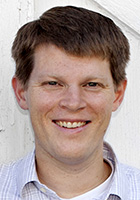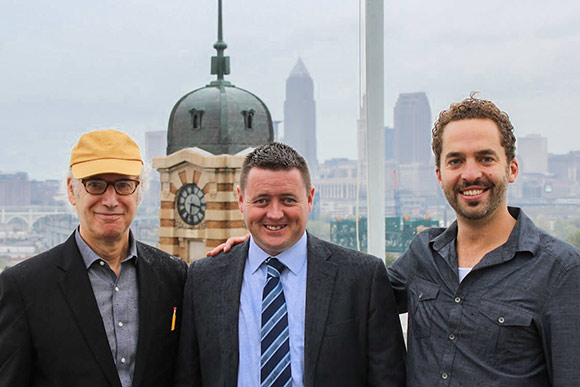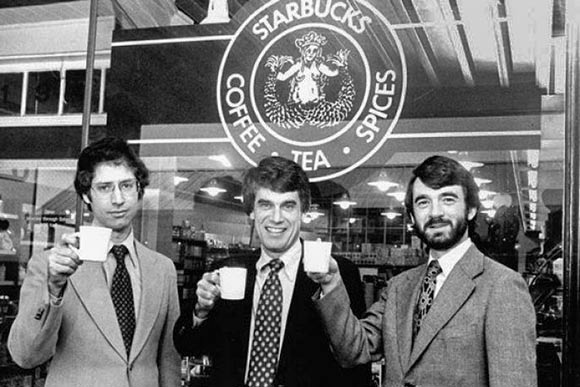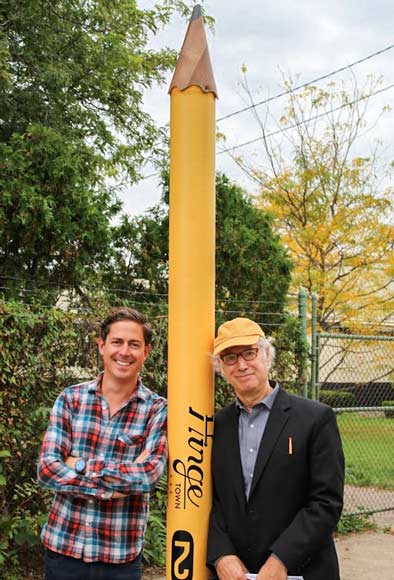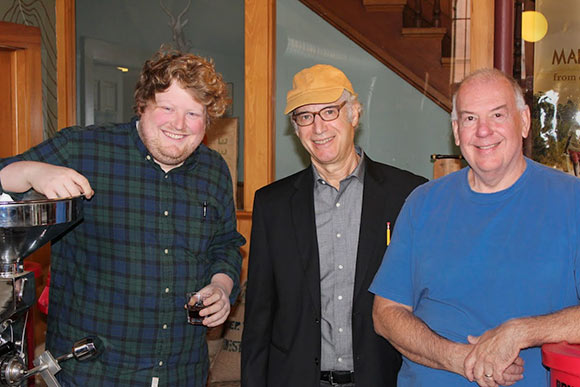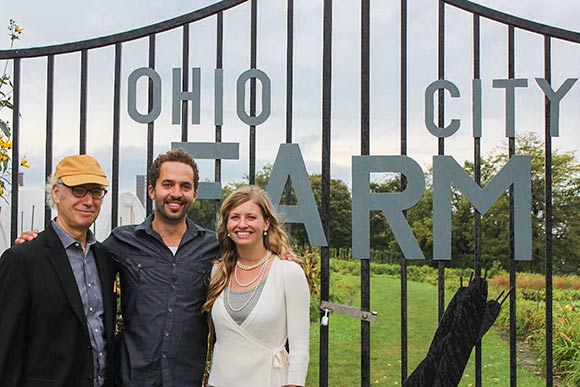visit to cleveland 'lit my fire,' says starbucks co-founder
When Zev Siegl co-founded Starbucks with Jerry Baldwin and Gordon Bowker in 1971, "coffee culture" didn't exist yet. The three entrepreneurs gradually opened six stores over the course of a decade, roasting and selling beans, tea and coffee making equipment. When Siegl sold his share of the company in 1980, the only coffee brewed in the stores was given out as samples. By the late 80s, under the ownership of Howard Schultz, the company was opening two stores a day.
Yet Siegl, who has spent the last three decades launching new startups, helping with business turnarounds and consulting with small businesses, has absolutely no regrets. “I’m an early stage guy,” he says unassumingly. “I’m uncomfortable with layers of management.”
He was in town last week to speak to entrepreneurs at Bizdom and Blackstone Launchpad and give a talk at the new Tinkham Veale Center at Case. His nuts-and-bolts presentation touched on the basics of building a startup, from developing individual profit centers in the business to identifying the right types of alternative funding to sourcing a team of complementary employees.
I was fortunate to be able to hook up with Siegl and give him a proper Cleveland welcome. We started out the day with a look at downtown. Siegl, who was born in Detroit and has a bit of a Rust Belt soul, was impressed by the neoclassical, industrial-era architecture that abounds in Cleveland. Seattle, which is a much younger city by comparison, can’t hold a candle to our classic buildings.
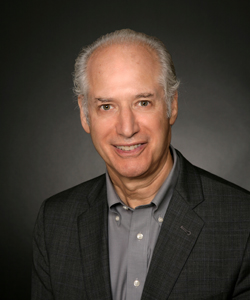 ZevSiegl
ZevSiegl
“Coming in on the train to Tower City, that was cool,” said Siegl of taking the Red Line from the airport to the Renaissance Hotel. “Wow! That view really lit my fire.”
Our tour continued across the river at Hingetown, where entrepreneur Graham Veysey discussed his efforts to create a sense of place and community in a neglected part of Ohio City. Veysey started by populating the firehouse with cool companies. The Transformer Station project ignited further interest. Finally, Veysey and his partner Marika Shioiri-Clark helped buy and renovate the Striebinger building, filling it with new tenants.
Veysey introduced Siegl to Kim Jenkins, owner of Rising Star Coffee. Rising Star partner John Johnson was also on hand. It was the ultimate old-school-meets-new-school moment -- the founder of coffee culture meets the new vanguard.
Next, we spent the afternoon touring Ohio City with Sam McNulty of Market Garden Brewery. We bumped into Mark Owens and Daniel Brennan of Skylight Financial and Mike Mitchell of Mitchell’s Ice Cream along the way. Highlights included taking in the view from Skylight Financial as we learned about the firm’s sponsorship of the Gay Games; checking out the new Mitchell's; and touring the under-construction Palace of Fermentation with McNulty, who purchased the 43,000 square foot building for $800,000, or the price of a Seattle condo.
"If I were to tell my Seattle friends what's happening here, they'd say yeah, yeah," said Siegl midway through the tour. "Someone ought to take 100 people from Seattle and bring them here on a plane. They'd be blown away."
Afterwards, he answered a few questions about his impressions of Cleveland’s startup scene, what it was like to run Starbucks in the 70s and what he’s up to now.
What are your takeaways of Cleveland's entrepreneurial scene/startup environment?
Cleveland’s entrepreneurship community appears to have well-rooted pride in what Cleveland is and what it might become. People seem to be planning and building companies not just because they want to make money or “do it my way,” but because it will help the community.
What lessons can we learn from other cities? What lessons do we have to share with other cities?
Bizdom and other entrepreneur-support programs are having a big impact in Cleveland. So is the emphasis on business development that I see at Case Western Reserve University. Cities that lack programs and early-stage funding for emerging companies are at a disadvantage.
The "This isn't just for me" attitude that I notice in Cleveland should be emulated elsewhere. On the West Coast, I do not sense that as strongly. Cleveland entrepreneurs seem to want to contribute to their city as well as make money for themselves.
What was a "day in the life" like for you and your cofounders when you created Starbucks in the 70s?
Like so many owners of new businesses, we worked hard! We also encountered many surprises due to being business newbies. We also suffered through anxious times when we expanded beyond our capital base.
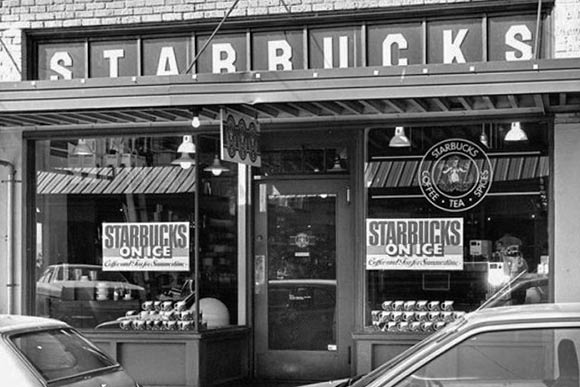 Starbucks Coffee Pike Place store in 1987
Starbucks Coffee Pike Place store in 1987
In the first few years of Starbucks, when it was a new business and only in Seattle, the three founders were going through intense on-the-job training. I was the company’s first employee, charged with both developing and operating our stores. Jerry Baldwin gradually ramped up his time with the company. He was the financial guy and also managed our coffee production. Gordon Bowker was our marketing guru; he didn’t work at the company, but he guided every aspect of our positioning in the marketplace.
You mentioned Alfred Peet, founder of Peet’s Coffee and Tea, as a mentor. What was the most important advice he ever gave you?
The best advice Alfred Peet gave us was, “No compromise on product quality, ever!” He was a stickler about that at his own company and it became our credo, too. There were many times when little compromises tempted us, but the three of us and our key managers always took the high road on the quality of what we offered.
Marketing is about how customers experience your product. What did Starbucks do to help foster the notion that retail creates experiences?
In the ‘70s and in the present time, Starbucks embraced its customers and welcomed them to our stores and our products. We gave away samples of brewed coffee and tea to everyone who wanted one for TEN YEARS. Our customers of course loved that, but it also helped us educate their palates, which was a benefit to them and a plus for us, too.
We must have been good marketers: I actually married a customer in 1972 and we celebrated our forty-second anniversary this year.
What are 2-3 early entrepreneurship lessons or experiences you draw from daily?
Based upon first-hand experience and working with hundreds of small companies and individual entrepreneurs, they are:
1. Understand your financial information and review it frequently.
2. Respect/understand the capabilities of competitors, both direct competitors and companies that compete with you indirectly.
3. Hire people who are much more experienced and/or capable than you are.
How has the coffee industry changed since the 1970s/80s, for better or worse?
The continually emerging new companies fascinate me. Rising Star in Cleveland’s Hingetown area of Ohio City is an excellent example of what I mean.
I do admire the new independent coffee shops. I love the passion of many young baristas. I am amazed by the many ways that a coffee bar will brew coffee for customers today: pour-over, espresso, filter-drip, French press, cold-water extraction, etc. And latte art made with steamed milk has gone from cool to unbelievable!
Why are you so focused on young, early-stage startups? What are you doing now to help them?
I completely identify with early stage business people. They’ve chosen a really tough row to hoe. To succeed they’re required to do an impossible number of different things right! I’ve been there several times. So, when I can help them, I’m happy.
I speak to audiences of young entrepreneurs worldwide; Russia, Kuwait, the UK and Cleveland, too. When I’m not on the road, I have clients in Seattle and I also volunteer time with a few individual new companies and with the MBA programs at two big universities. Combined, these add up to “full giveback mode.” I find it more than a little fulfilling.
